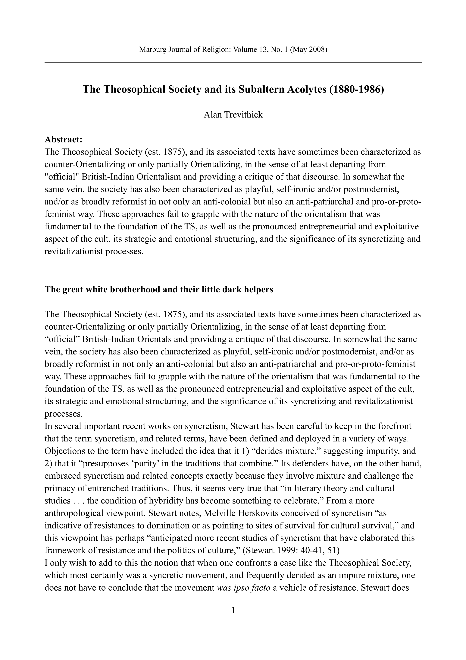The Theosophical Society and its Subaltern Acolytes (1880-1986)
The Theosophical Society (est. 1875), and its associated texts have sometimes been characterized as counter-Orientalizing or only partially Orientalizing, in the sense of at least departing from "official" British-Indian Orientalism and providing a critique of that discourse. In somewhat t...
Sábháilte in:
| Foilsithe in: | Marburg Journal of Religion |
|---|---|
| Príomhchruthaitheoir: | |
| Formáid: | Artikel (Zeitschrift) |
| Teanga: | Béarla |
| Foilsithe / Cruthaithe: |
Philipps-Universität Marburg
2008
|
| Rochtain ar líne: | Rochtain ar líne |
| Clibeanna: |
Cuir clib leis
Níl clibeanna ann, Bí ar an gcéad duine le clib a chur leis an taifead seo!
|
| Achoimre: | The Theosophical Society (est. 1875), and its associated texts have sometimes been characterized as counter-Orientalizing or only partially Orientalizing, in the sense of at least departing from "official" British-Indian Orientalism and providing a critique of that discourse. In somewhat the same vein, the society has also been characterized as playful, self-ironic and/or postmodernist, and/or as broadly reformist in not only an anti-colonial but also an anti-patriarchal and pro-or-protofeminist way. These approaches fail to grapple with the nature of the orientalism that was fundamental to the foundation of the TS, as well as the pronounced entrepreneurial and exploitative aspect of the cult, its strategic and emotional structuring, and the significance of its syncretizing and revitalizationist processes. |
|---|---|
| DOI: | 10.17192/mjr.2008.13.3600 |
 Publikationsserver
Publikationsserver